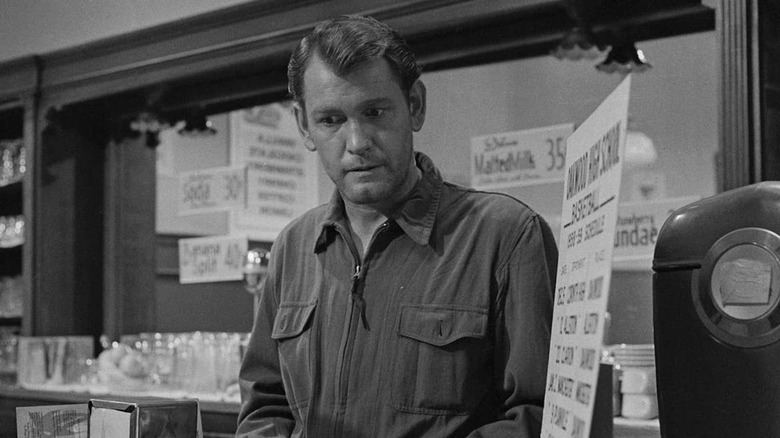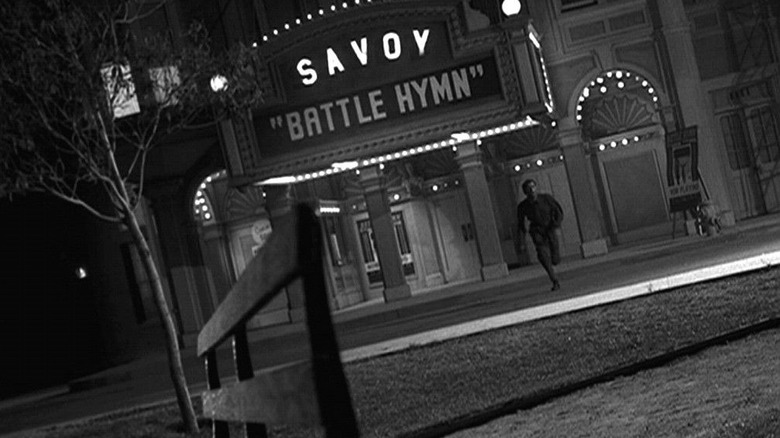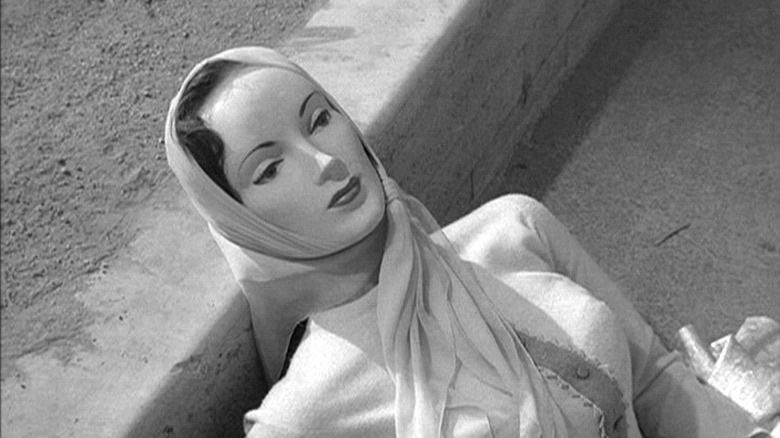The Twilight Zone Episode Where Is Everybody Hit A Few Bumps Behind The Scenes
This post contains spoilers for the first episode of "The Twilight Zone."
The first episode of Rod Serling's anthology series "The Twilight Zone" aired on October 2, 1959. The episode was called "Where Is Everybody?," and it starred Earl Holliman as a man with no memories, walking down a dirt road. He arrives in a small town. No one is there. He cries out for anyone, but no one answers. He tries the public telephone, but there is no operator. He sees a woman in a car, but she turns out to be a mere mannequin. He helps himself to some diner food, which is still fresh. Machines seem to operate on their own, as when our hero goes to a movie theater and the picture starts automatically. What is happening? Is everyone hiding? Where is everybody? The solitude slowly begins to drive him into a panic.
The twist ending: the man is not isolated in a small American town but inside a small sensory isolation booth. He is an Air Force officer named Mike Ferris, and the small town was a hallucination brought on by 484 straight hours of deprivation. This was a test to see if solo pilots could stomach the isolation of an extended space voyage. As it happens, he cannot.
"Where Is Everybody?" was a stirring way to kick off the show, and remains one of the series' more memorable episodes. "The Twilight Zone" took off with a comfortable stride. Shooting "Where Is Everybody?," however, was not a lot of fun. Indeed, according to a 2019 retrospective in the New York Times (for the episode's 60th anniversary), Holliman looked back and recalled some camera issues that cost him and the rest of the crew a full day of shooting.
Playing sick
Holliman recalled the shoot well, largely thanks to said camera issues, as well as a series of other increasingly bothersome maladies. "Where Is Everybody?" was shot on the Universal backlot, using the same courthouse square used in "To Kill a Mockingbird," "Inherit the Wind," "Gremlins," "Back to the Future," "Elvira: Mistress of the Dark," and The Offspring's "Why Don't You Get a Job?" music video. Holliman remembers sharply the shock of dismay when the shooting came to an end on "The Twilight Zone." He said:
"The first day was long, and at the end of it, I heard the camera guy say, 'Uh, oh,' which is not what you want to hear. Well, they checked the camera and there was some small problem and we didn't get a single shot. So we all went home with our heads between our legs."
Holliman doesn't elucidate on what the camera issue might have been, other than to say no useable footage was captured that day. And that wasn't the end of it for the episode's problems.
The following day Holliman awoke to a 102° fever, perhaps because of his fatigue on the first day of shooting. Despite his illness, Holliman reported to set, hoping that his genuine fever would contribute to his character's increased disorientation. Sadly, it didn't work that way for the actor, and he had to leave the set to rest. A lesson for us all: even if you're an actor playing someone with a 102° fever, don't actually show up to the set with a 102° fever. Holliman apologized to the New York Times for not actually being disoriented.
The director hates me
Holliman, now 94, had a prolific career that began in 1952 with a bit role in the Western film "Pony Soldier." He played the cook in "Forbidden Planet," and appeared in hit 1950s films like "The Big Combo," "Giant," "The Rainmaker" (for which he won a Golden Globe). He steadily worked in films and on TV for decades, and played central roles in series like "Police Woman," "Delta," and the 1997 superhero series "Night Man." Holliman was also a regular installment on game shows like "Hollywood Squares" and "The $25,000 Pyramid."
One would think that such a prestigious career indicated a bold, confident actor who was assured and forthright. Holliman claimed, however, that he was actually quite timid and required a lot of direction back in 1959 when he was filming "The Twilight Zone." He admitted his insecurity to the Times, and found that the director of "Where Is Everybody?," Robert Stevens, wasn't willing to assuage him. He said:
"I'm not the most secure actor in the world — at least I wasn't then. [...] Robert Stevens, the director, was terrific. But he wasn't very good at talking with actors. Every time I came over to ask him about my role, he excused himself and pretended he had to take a phone call. I was concerned that I wasn't doing a good job!"
If Holliman happens to be reading this, I think I can speak for everyone when I say that he did a crackerjack job and that his panic and disorientation were genuine and palpable. Without his performance being as strong as it was, "The Twilight Zone" might not have started as strong as it did.


